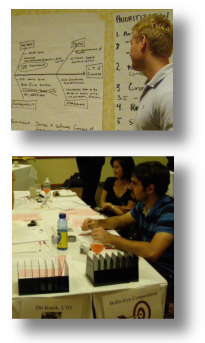Ireland waters: cash realization
This 1-day lab helps everyone in the room “feel” the flow of information traveling across organizations and to see system performance clearly. Want to find speed in the Performance Chain? This lab demonstrates to participants how flow metrics can highlight the actions needed to increase velocity and departmental productivity in the back end of the Performance Chain.
In a 3-round simulation and an active exchange over results, participants:
- Spot and measure the impact of the story of flow, errors, reworks and customer service on business performance
- Use actual results from each simulation to prioritize and decide what to change with the goal of increasing performance
- Apply a repeatable approach to transform both the flow of transactions and the way people work together to make improvements sustainable

What is it?
- A one-day simulation-based lab where participants experience how customer transactions move through the web of a multi-department, multi-location organization
- Three iterative rounds that demonstrate the story of flow, errors, reworks and customer service data that are tied to business and financial performance
- An opportunity for participants to apply repeatable techniques to make process and decision-making changes that strengthen value for both customers and the organization
Who is it for?
- Any service organization
- Front line, business unit and service line teams
- Functional departments: product managers, customer service, operations, finance, planning
What you get:
- A shared experience to evaluate transactional processes from a “system” lens, and then an opportunity to prioritize critical improvements with real time data
- Knowledge about how to embed sustainable improvements through data-driven process change and system decision making
|
